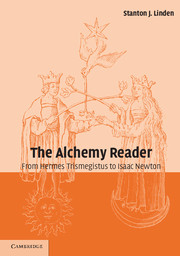Book contents
- Frontmatter
- Contents
- List of illustrations
- Acknowledgments
- List of abbreviations
- Illustrations
- Introduction
- Part I Ancient texts
- Part II Islamic and medieval texts
- Part III Renaissance and seventeenth-century texts
- 18 PARACELSUS (1493–1541): From Of the Nature of Things and Paracelsus His Aurora
- 19 FRANCIS ANTHONY (1550–1603): Aurum-Potabile: or the Receit of Dr. Fr. Antonie
- 20 MICHAEL SENDIVOGIUS (1566–1636 or 1646): From A New Light of Alchymie and A Dialogue between Mercury, the Alchymist and Nature
- 21 ROBERT FLUDD (1574–1637): From the Mosaicall Philosophy
- 22 GABRIEL PLATTES (first half of seventeenth century): A Caveat for Alchymists
- 23 JOHN FRENCH (1616?–1657): Preface to The Divine Pymander of Hermes Mercurius Trismegistus in XVII Books
- 24 GEORGE STARKEY/EIRENAEUS PHILALETHES (1628–1665?): The Admirable Efficacy, and almost incredible Virtue of true Oyl; From An Exposition Upon Sir George Ripley's Epistle to King Edward IV
- 25 ELIAS ASHMOLE (1617–1692): From the “Prolegomena” to the Theatrum Chemicum Britannicum
- 26 ROBERT BOYLE (1627–1691): From An Historical Account of a Degradation of Gold Made by an Anti-Elixir: A Strange Chymical Narative
- 27 SIR ISAAC NEWTON (1642–1727): The Key (Keynes MS 18); The Commentary on the Emerald Tablet (Keynes MS 28)
- Glossary
- Bibliography
- Index
18 - PARACELSUS (1493–1541): From Of the Nature of Things and Paracelsus His Aurora
Published online by Cambridge University Press: 05 October 2014
- Frontmatter
- Contents
- List of illustrations
- Acknowledgments
- List of abbreviations
- Illustrations
- Introduction
- Part I Ancient texts
- Part II Islamic and medieval texts
- Part III Renaissance and seventeenth-century texts
- 18 PARACELSUS (1493–1541): From Of the Nature of Things and Paracelsus His Aurora
- 19 FRANCIS ANTHONY (1550–1603): Aurum-Potabile: or the Receit of Dr. Fr. Antonie
- 20 MICHAEL SENDIVOGIUS (1566–1636 or 1646): From A New Light of Alchymie and A Dialogue between Mercury, the Alchymist and Nature
- 21 ROBERT FLUDD (1574–1637): From the Mosaicall Philosophy
- 22 GABRIEL PLATTES (first half of seventeenth century): A Caveat for Alchymists
- 23 JOHN FRENCH (1616?–1657): Preface to The Divine Pymander of Hermes Mercurius Trismegistus in XVII Books
- 24 GEORGE STARKEY/EIRENAEUS PHILALETHES (1628–1665?): The Admirable Efficacy, and almost incredible Virtue of true Oyl; From An Exposition Upon Sir George Ripley's Epistle to King Edward IV
- 25 ELIAS ASHMOLE (1617–1692): From the “Prolegomena” to the Theatrum Chemicum Britannicum
- 26 ROBERT BOYLE (1627–1691): From An Historical Account of a Degradation of Gold Made by an Anti-Elixir: A Strange Chymical Narative
- 27 SIR ISAAC NEWTON (1642–1727): The Key (Keynes MS 18); The Commentary on the Emerald Tablet (Keynes MS 28)
- Glossary
- Bibliography
- Index
Summary
Since the early sixteenth century, reactions to Theophrastus Philippus Aureolus Bombastus von Hohenheim or Paracelsus have often been as contentious and controversial as the subject himself. Both enfant terrible and revolutionary genius in his formulation of new medical theories and practical cures and procedures, the Swiss-born Paracelsus continued to provoke violent disagreement long after his death in 1541. In addition to medicine and surgery, he received early training in mining, metallurgy, and alchemy; his peripatetic education, like his later career, led him to many locations throughout Europe. Although Paracelsus practiced healing, lectured widely, and wrote voluminously on medical topics, his controversial views and disputatious manner made publication of his ideas rare until after his death. His major contribution to alchemy was its reorientation from gold-making and the pursuit of the philosopher's stone to the formulation and application of medicinal preparations from minerals and chemicals. This shift – combined with his outspoken anti-authoritarianism – necessarily brought him and his followers into conflict with the “official,” academic medical establishment dominated by Galenic physicians and pharmacists who favored herbal medicines (see Allen G. Debus, The English Paracelsians). Paracelsus also wrote in German – not the preferred Latin – and his emphasis on practical experience, experiment, and folk medicine resulted in further alienation.
The following selections from two treatises, Of the Nature of Things and the Aurora (which may be the work of his editor and translator Gerard Dorn), introduce several key Paracelsian ideas, such as the “three-principles theory” (tria prima) of salt, sulphur, and mercury, the making of the homunculus, the generation of metals, the doctrine of signatures, and the role of magic and astrology in his practice of the “Spagyrical Art.”
- Type
- Chapter
- Information
- The Alchemy ReaderFrom Hermes Trismegistus to Isaac Newton, pp. 151 - 169Publisher: Cambridge University PressPrint publication year: 2003



